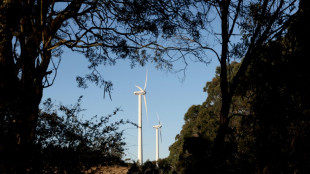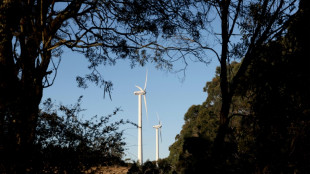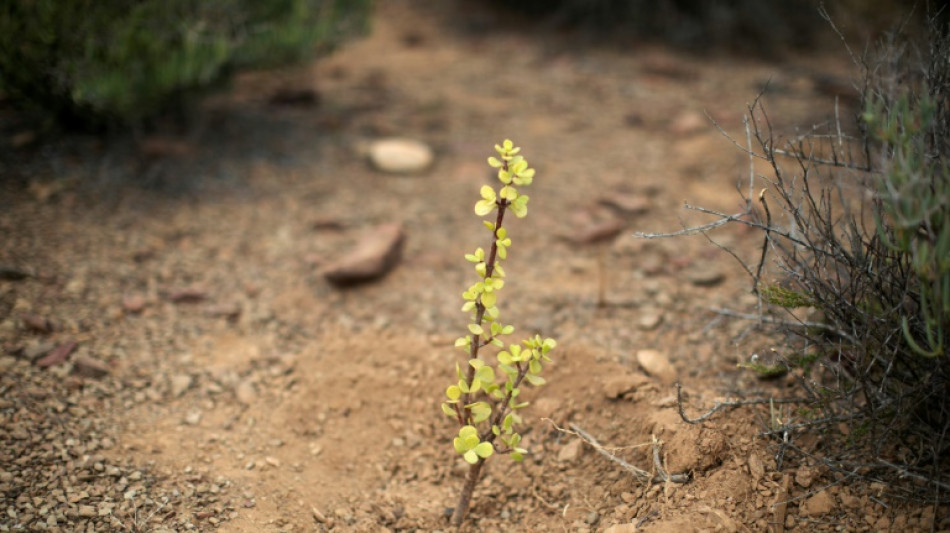
-
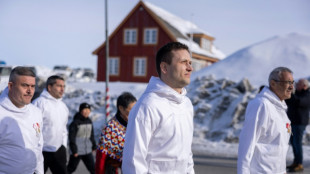 Greenland PM visits Denmark as Trump threats loom
Greenland PM visits Denmark as Trump threats loom
-
Philippines, US test air defences as China seizes reef

-
 25 killed, fires still burning in huge Iran port blast
25 killed, fires still burning in huge Iran port blast
-
India and Pakistan troops exchange fire in Kashmir

-
 Eighteen killed, fires still burning in huge Iran port blast
Eighteen killed, fires still burning in huge Iran port blast
-
No handshake at muted India-Pakistan border ceremony

-
 Maligned by Trump, White House reporters hold subdued annual gala
Maligned by Trump, White House reporters hold subdued annual gala
-
Austria trials DNA testing to uncover honey fraud

-
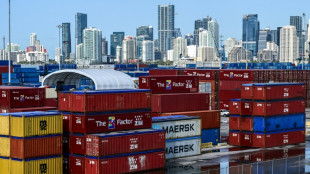 Trump trade war pushes firms to consider stockpiling
Trump trade war pushes firms to consider stockpiling
-
D'Backs' Suarez becomes 19th MLB player to hit four homers in one game

-
 Continuity or rupture: what direction for the next pope?
Continuity or rupture: what direction for the next pope?
-
Surridge scores four as Nashville smash seven past Chicago

-
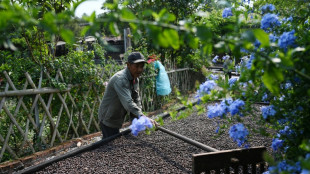 Chinese tea hub branches into coffee as tastes change
Chinese tea hub branches into coffee as tastes change
-
Diplomacy likely to trump geography in choice of new pope

-
 All eyes turn to conclave after Pope Francis's funeral
All eyes turn to conclave after Pope Francis's funeral
-
Doves, deaths and rations: Papal elections over time

-
 Progressive Canadians say social issues blown off election agenda
Progressive Canadians say social issues blown off election agenda
-
Liverpool primed for Premier League title party

-
 Buenos Aires bids farewell to Francis with tears, calls to action
Buenos Aires bids farewell to Francis with tears, calls to action
-
Thunder sweep past Grizzlies in NBA playoffs, Cavs on brink

-
 Major blast at Iran port kills 14, injures 750
Major blast at Iran port kills 14, injures 750
-
'What we live for': Kounde after winning Barca Copa del Rey final

-
 More McIlroy magic at PGA pairs event but Novak and Griffin lead
More McIlroy magic at PGA pairs event but Novak and Griffin lead
-
Fire rages after major blast at Iran port kills 14, injures 750

-
 Denkey wonder-strike keeps Cincinnati on track in MLS
Denkey wonder-strike keeps Cincinnati on track in MLS
-
Barca edge Real Madrid in extra-time to win wild Copa del Rey final

-
 'Legendary' Eubank Jr beats Benn in grudge bout
'Legendary' Eubank Jr beats Benn in grudge bout
-
Thunder sweep past Grizzlies into NBA playoffs 2nd round, Cavs on brink

-
 South Korea's Ryu and Japan's Saigo share LPGA Chevron lead
South Korea's Ryu and Japan's Saigo share LPGA Chevron lead
-
Canada leaders make closing pitches in campaign upended by Trump

-
 De Bruyne's Man City exit 'so difficult' for Guardiola
De Bruyne's Man City exit 'so difficult' for Guardiola
-
'No regrets' for Amorim over Man Utd move

-
 Lyon and Strasbourg win to close in on Europe, Montpellier relegated from Ligue 1
Lyon and Strasbourg win to close in on Europe, Montpellier relegated from Ligue 1
-
Toulouse thrash Castres as Top 14 pursuers stumble

-
 Djokovic crashes to nervous Arnaldi in Madrid opener, Swiatek advances
Djokovic crashes to nervous Arnaldi in Madrid opener, Swiatek advances
-
Olympic champs Russell, Davis-Woodhall win at Drake Relays

-
 Browns end Sanders long draft slide
Browns end Sanders long draft slide
-
Cavs crush Heat, on brink of NBA playoff sweep

-
 Fire rages after major blast at Iran port kills 8, injures hundreds
Fire rages after major blast at Iran port kills 8, injures hundreds
-
Kiwi Beamish wins Penn Relays 1,500m crown with late kick

-
 Mbappe on Real Madrid bench for Clasico Copa del Rey final
Mbappe on Real Madrid bench for Clasico Copa del Rey final
-
England survive France fightback to seal Women's 6 Nations slam

-
 Palace sweep past Villa to reach FA Cup final
Palace sweep past Villa to reach FA Cup final
-
CAF appoint Moroccan Lekjaa first vice-president

-
 Major blast at Iran port kills 5, injures hundreds
Major blast at Iran port kills 5, injures hundreds
-
Rodgers vows to stay with Celtic after fourth successive Scottish title

-
 Ipswich relegated as Newcastle, Chelsea boost top five bids
Ipswich relegated as Newcastle, Chelsea boost top five bids
-
Canada leaders make final pitches in campaign upended by Trump

-
 Mullins -- Ireland's national training treasure
Mullins -- Ireland's national training treasure
-
US, Iran say progress in 'positive' nuclear talks


Spekboom bushes protect earth but can they cool Earth?
Andre Britz pulled over his pick-up truck on a rocky mountain track to show off the nature-preserving powers of southern Africa's spekboom shrub.
The 62-year-old Afrikaner is an evangelist for Portulacaria afra, a red-stemmed bush or small tree with thick, dense green leaves that acts as a sponge for carbon dioxide.
"Here you can see the difference between degraded land and what we call pristine spekboom veld," he said, pointing out a division running like a contour between lush green hilltop and arid valley side.
The plant once dominated the dry terrain of the Little Karoo in South Africa's Western Cape.
But decades of what Britz calls over-grazing and mismanagement have destroyed the shrub and the vital shade it offers the sun-scorched earth, not to mention its strength at absorbing carbon.
"The spekboom does carbon sequestration day and night. It is one of the few plants that do it," Britz told AFP on a tour to explain his ten-year-old mission.
"And the other thing is that it occurs here naturally," he said. "So that was why it was important to plant spekboom here and to have that secondary effect on the change of climate."
Ten years ago Britz founded Jobs 4 Carbon, an organisation dedicated to replanting and encouraging the spekboom in an area where farming was devastated by the long 2015-2020 drought.
Now he has a team of planters, labouring with shovels and picks in the rocky terrain to nurture new plants that could once more blanket the dry ground with lush green leaves.
- 'Miracle plant' -
Nearby, a two-year-old replanted Spekboom has begun to spread its branches above fresh shoots. Jobs 4 Carbon has already replanted almost 700 hectares (1,730 acres).
"It brings nature back to life," team leader Jan Cloete, 49, said with a smile.
To botanist Alastair Potts, 41, in its natural semi-arid ecosystem or "subtropical thicket", it is a "miracle plant".
It "creates forest-like micro-environments", a "carpet" of leaves that "trap water and dust and nutrients", as well as carbon, he said.
The latter is stored in large quantities because of the succulent's rare ability to swing between two types of photosynthesis.
In dry, hot weather, spekboom sucks carbon dioxide out of the atmosphere at night and stores it in the form of malic acid.
During the day, the plant closes its pores, called stomata, to minimise water loss and uses its night stash for photosynthesis.
This greatly boosts its sequestration capacity.
Fact-checkers have debunked overenthusiastic claims that the plant rivals the Amazon rainforest in terms of carbon absorption, but proponents say it still pulls above its weight when allowed to grow in its natural environment.
A 2006 paper estimated that one hectare of spekboom sequestered on average four tonnes of CO2 per year. Others put the figure at more than 15 tonnes.
- Carbon credits -
Jobs 4 Carbon is hoping to plant more of it and fund the venture selling carbon credits, a financial instrument bought by companies to offset their greenhouse gas emissions.
To make that viable, however, scientists first have to agree on just how much CO2 the little succulent exactly sequesters.
Still, Potts is optimistic. Spekboom doesn't have the drawbacks of other tree-planting projects criticised for setting up monocultures in unsuitable ecosystems, he said.
And by restoring the environment, it helps prevent emissions from land degradation.
"I feel that carbon farming and spekboom is the perfect mix," he said.
"We're changing the ecosystem functioning back to what it was, through carbon, which is fantastic."
With funding from international foundations and private companies, Jobs 4 Carbon is looking to green 13,000 hectares across the region, said Andre Britz.
But much more could be done across the country, according to Potts.
The group currently plants the shrub for free if landowners agree to leave their plot fallow for at least 15 years in return.
In the courtyard of his village church, 15,000 small plants are ready to put down roots in the arid ground, which reminds him of an old saying he heard from his grandfather: "Take care of your veld, and your veld will take care of you".
X.Karnes--AMWN
